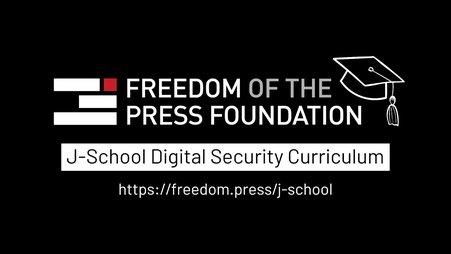Hello again!
It’s Martin, deputy director of digital security at Freedom of the Press Foundation (FPF), with our regular update on the U.S. Journalism School Digital Security Curriculum.
J-school security curriculum update
- We’re thrilled to share our newest module! In collaboration with the Electronic Frontier Foundation, the University of Texas El Paso's Multimedia Journalism Program, and Borderzine, we've put together a new module focusing on the needs of students living and working near the U.S. southern border. This project, first pitched by Dave Maass at EFF, has been baking for a couple of years. In the final iterations, we had fun teaching with these materials at the University of Texas at El Paso, as well as San Diego State University, and we’re really happy with how it turned out. Read our announcement post and check out the new module.
- Please be sure to let us know if you have any questions, need any assistance integrating these materials, or simply want to let us know if you will use these materials in your coursework.
Highlights from digital security in the news
- The Washington Post experienced a breach of its Microsoft email accounts, reported The Wall Street Journal. It appears targets included staffers on national security and economic policy teams, “including some who write about China,” according to people familiar with the breach. https://www.wsj.com/tech/cybersecurity/cyberattack-on-washington-post-compromises-email-accounts-of-journalists-70bf1300
Suggested module: Chat safety - In light of a spike in requests from journalists about how to prepare their devices in case of seizure at the border, we put together a new guide in collaboration with EFF on preparing your devices before crossing a U.S. border. It walks through U.S. Customs and Border Protection policy and practices, how this might affect you depending on your legal status and citizenship, as well as what you can do to minimize the risks of exposing your personal data. https://freedom.press/digisec/blog/border-security/
Suggested modules: Device protection, Law enforcement surveillance tech - The chief administrative officer at the U.S. House banned WhatsApp from representatives’ government devices. Guidance warned that “The Office of Cybersecurity has deemed WhatsApp a high-risk to users due to the lack of transparency in how it protects user data, absence of stored data encryption, and potential security risks involved with its use,” according to Axios. This decision comes immediately following bombings in Iran, where state television told citizens to remove WhatsApp from their phones, claiming without evidence that the app could share information with Israel. WhatsApp is end-to-end encrypted and so should not be able to share the content of conversations. However, the app does share some information about users (e.g., IP address) and conversations (e.g., group names) with WhatsApp’s parent company, Meta.
https://gizmodo.com/iranian-and-u-s-officials-agree-whatsapp-is-the-new-security-boogeyman-2000619020
Suggested module: Chat safety
What we’re reading:
- In a new report from Google and Morning Consult, researchers examined Americans’ experiences of online scams. Their survey of 3,018 American adults suggests 60% of Americans feel they’ve been exposed to an increase in scam attempts over the past year, noticing these attempts most often over text messages and emails. The report also examined password practices and familiarity with various authentication methods. I have to wonder, though, where people are being scammed successfully, did respondents simply not notice it happening? Give it a read: https://pro-assets.morningconsult.com/wp-uploads/2025/06/Google-x-Morning-Consult-US-Consumer-Scams-and-Protections-Blog-Report.pdf
As always, let me and our team know how you’re using the curriculum, what’s useful, and how it can be improved! Feel free to respond to this email or [email protected].
Thanks so much,
Martin
--
Martin Shelton
Deputy Director of Digital Security
Freedom of the Press Foundation




